 |
Home | SchNEWS OF THE WORLD
Argentina Special
Eyewitness Accounts
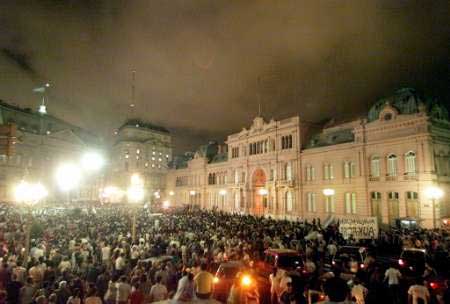 The
Presidential Palace - The Casa Rosada - on the central Plaza de
Mayo, 20th December The
Presidential Palace - The Casa Rosada - on the central Plaza de
Mayo, 20th December
An eye-witness account of the uprising of the 19th December, posted
on indymedia
“ I was watching television, seeing the lootings and the uprisings
in the country’s interior. Suddenly the president appeared
on the screen, he was talking about differentiating between criminals
and the needy. He spoke quietly, almost elegantly, trying to sound
in charge. He said he had announced today the state of emergency.
I knew that it is unconstitutional in Argentina for the president
to declare a state of emergency, only the congress can do that.
I was disgusted and I turned off the TV.
I started hearing a sound…a very quiet sound, but growing.
I went to the balcony of my apartment and looked out - people on
every balcony banging pots and pans. The sound got louder and louder…
it was a roar, and it wasn’t going to stop. I saw some people
on the corner of the street I live, no more than 10. I put on a
shirt and went down. On every corner I could see people gathering
in small groups. This is a comfortable middle class neighbourhood,
but everybody’s been fucked by what’s going on, and it’s
been going on for far too long. On the corner of the next street
people had started gathering on the middle of the streets. Banging
spoons against pans, waving flags…in a few minutes we were
something like 150 people.
We started walking. Nobody seemed to know where we were going or
what was gonna happen…an hour had gone by since the banging
started and the noise wasn’t stopping, coming from every corner
of the city. As we walked, people were joining us, it was exciting,
almost manic. The feeling of regaining your own power. I looked
back and suddenly this spontaneous demonstration was a couple of
blocks long. I could see people in suits and people in working uniforms.
I could see young girls in nice clothes and senior citizens in old
clothes. I could see the small businessman who is suffering from
higher and higher taxes and it’s about to lose his house from
his bank loans and the young man who has been excluded by the system
and couldn’t get a job for 4 years. Everybody was represented.
It was amazing. People cheered from the balconies, small pieces
of shredded paper falling slowly to the streets…singing, banging,
marching.
When I got to Congress, a couple of thousand people were already
there and I could see more people coming in from every corner. It
felt like a party. The flags waving, the chants, the clapping. A
guy at the top of the steps lit some sort of smoke-flare - pink
smoke all over the place. I looked around, I don’t know why
but I started feeling tense. People kept on coming and we started
marching to the Casa Rosada. Things didn’t feel exciting anymore,
it felt tenser and tenser. I could see some fire on the street ahead
- a small trashcan on fire. I kept on walking. Some people were
quietly singing and clapping but I saw other small fires. I had
entered a column that came from a tougher neighbourhood than mine.
I don’t blame them - they’ve been fucked way harder than
anybody else and hunger breeds anger. A young guy was banging a
stick against a street sign, and this thirtyish guy, skinny and
dressed in really old jeans and shirt, holding a young girl in his
arms, said something to him. The young man looked back, he saw the
columns of people. I could catch this phrase from the skinny guy
“Look at how many we are”. I looked back. I saw and felt
what I felt at the beginning. Everybody was there, everybody was
represented, we were so many.
When I got to Plaza de Mayo a couple of thousand were there and
they kept on coming. People started coming in on cars as well as
marching. Young people, old people, families - the people. I walked
around. Amazed. I was thinking that not many days you go to the
balcony to check the noises coming from the streets and you end
up being a witness to a presidential deposal by social uprising.
Suddenly I was pushed in the back by somebody. When I regained balance
I saw people running away. Somebody was yelling “Sons of bitches”
right next to me. Out of instinct I started running with them. I
ran half a block, stopped and looked back. I saw thousands of people
running.
Somebody passing me said something about the police. I couldn’t
quite understand…my nose started itching. I looked back - in
the plaza, 500 metres back, I could see smoke. People’s eyes,
they were reddening. My throat hurt. I ran. People were going off
in all directions away from the plaza. The smoke got higher and
higher, I took off my shirt and covered my nose and mouth. My eyes
itched. I got pretty far and looked around. This guy in a Miami
Florida T-shirt, absolutely middle class, said he now understood
what the piqueteros felt. I suddenly realized I was crying. I didn’t
know if it was from the tear gases or from impotence and anger.
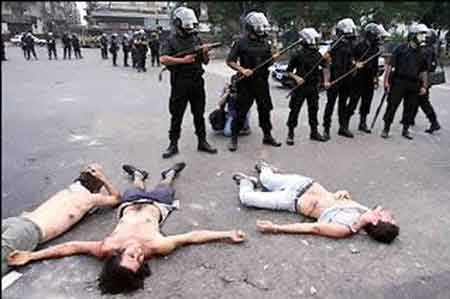 *
Serious street fighting followed, that night and the next day, and
35 people were killed during the two-day insurrection; 5 were shot
dead by police in and near the Plaza de Mayo, and many others were
killed by police and shop-keepers during lootings. *
Serious street fighting followed, that night and the next day, and
35 people were killed during the two-day insurrection; 5 were shot
dead by police in and near the Plaza de Mayo, and many others were
killed by police and shop-keepers during lootings.
Que Se Vayan Todos (out with all politicians)
The following is a condensed version of eye-witness reports
sent to Schnews from Buenos Aires in January.
Fri, 18 Jan 2002
The streets are emptier in Buenos Aires at night, than I have ever
seen them. In the centre of the city in the daytime it’s as
crowded as ever. Queues for exchange bureaux stretch around blocks.
There’s a feeling in the air of anxiety and barely-surpressed
anger. Walking down the main pedestrian avenue, Florida, I heard
a woman laugh too loud, and everyone jumped and shot her alarmed
stares. ‘Ladrones usureros’ - usurers, thieves is scratched
onto the marble plaque outside the Bank of Boston. The Lloyds and
HSBC banks have put up enormous metal panels over their windows;
in the provinces, banks are being ransacked every day. The TV news
shows protest after protest; today in Santiago del Estero, in the
North, there are barricades in the streets and brutal police repression
of the mostly middle-aged working men who are demanding ‘Dignidad
para el obrero’ - dignity for the workers. In La Quiaca, ,
people are crucifying themselves every day, 5 hours each in the
hot sun, while the children hold signs saying ‘pan y trabajo’
(bread and work) and ‘luchamos contra el hambre’ (our
struggle is against hunger). Yesterday, after a cacerolazo outside
the Supreme Court to demand the resignation of its 9 judges, the
people went to the home of one of the judges and continued there.
Politicians and judges can’t walk the streets in case they
are recognized - a friend was queuing at a bank the other day when
a judge drew up in a car and tried to go in. Everyone started abusing
him - ‘ratta!’ (rat), ‘corrupto’, ‘hijo
de mil putas’ (son of a thousand whores), until he took refuge
in his car and left.
Peoples’ fury at their inability to access their savings,
due to banking restrictions, is worsened by news of 386 trucks stuffed
with cash, which ferried an estimated 26 billion dollars to the
airport after banking restrictions had been imposed, for transfer
to Uruguay and beyond. Given the numerous stories of massive ‘capital
flight’ over the early days of this crisis, and of businesses
and banks which mysteriously took out fortunes before and during
the strict new measures, people think most of their money will never
be seen again. There are many for whom the corralito means nothing
– they have nothing in the bank. Unemployment is over 20%,
and there is hunger in many areas. Pensioners are badly affected.
They have had no pensions since November - millions of workers are
going unpaid. The state medical system, PAMI, has collapsed due
to lack of funds. There is an extreme shortage of insulin and other
common drugs, because they are imported and because many drugs were
withdrawn from the shelves by pharmaceutical companies, to protect
prices. In the outlying, poorest barrios people have arms and use
them, but actual robberies are outstripped by paranoia and vigillanteeism,
born of government disinformation about supposed widespread looting
of homes. Many people are trying to leave the country, reluctantly
but seeing no future in Argentina - when it was reported this week
that Poland was to join the EU, a queue formed immediately at the
Polish embassy. Thousands of the large Chilean population of Mendoza
have gone home, as have many of the Bolivian, Peruvian and Paraguayan
migrant workers. People talk bitterly of institutional corruption
from top to bottom. Now, as well as blaming the IMF, the free market
economy forced on them by Menem (the whole-sale selling off and
privatisation), and the constant flight of capital abroad, people
are beginning to blame themselves. It’s bitter and humiliating.
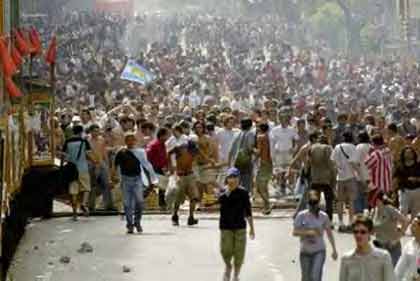 Mon,
21 Jan 2002 Mon,
21 Jan 2002
Yesterday we went to the general assembly, the ‘Interbarrial’,
of the almost 100 neighbourhood (‘barrio’) assemblies
of Bs. As. in Parque Centenario, and attended by about 2,000 people.
There were speeches from each barrio, telling of their experiences,
listing actions they planned and putting forward proposals. There
was a lot of talk about the Supreme Court and continuing the protests
against it until all the judges resigned - or to go in and boot
them out themselves. The media was denounced by many speakers for
its lies and distortion; meanwhile, the news that there were TV
crews from Japan, Spain, UK and Finland present at the assembly
was greeted with cheers, while the mention of a US TV crew met with
angry whistles and boos. There were no Argentinian TV crews present
at all. Speakers suggested that anyone who had held a political
post in the last 30 years should be disqualified from ever doing
so again. They denounced the new budget and banking reforms due
to be announced this week as measures that were bound to suit the
‘yanquis’ (USA) - the new economy minister is a veteran
of 20 years’ service to the IMF. It was agreed that the visitors
from the IMF due here on Tuesday should be greeted with a ‘cacerolazo’.
A speaker proposed that ‘we stay in the streets till they have
all gone’ and commented on the importance of showing that it’s
not just the corralito they are against; that they want to change
it all. There was a minute’s applause for those who died during
the repression which followed the first cacerolazos of the 19th
and 20th of December and chants of ‘Policía Federál,
la verguenza nacionál’ - the Federal Police, a national
disgrace. Barrio after barrio made its proposals, and when the voting
through of the main proposals went ahead they were:
- Que se vayan todos (that all politicians should go)
- No to payment of the external debt
- Justice and punishment for the murderers and repressors
- Nationalisation of the bank and the privatised companies
- The Supreme Court - out!
- Return the money to depositors.
Tue, 29 Jan 2002
On Friday night, the 25th January, a national ‘cacerolazo’,
agreed at the assembly, began at 8pm with the sound of pans clanging
from balconies and in the streets and parks of the capital. By 10pm,
the enormous Plaza de Mayo was starting to fill and the noise was
already deafening,. Along the Av. de Mayo a steady stream of people
was pouring into the square; ‘asambleas barriales’ (neighbourhood
assemblies) arriving from the barrios, hundreds of families and
thousands of old people. The rain was coming on and off in the heat,
but everyone acted like they hadn’t noticed as the square filled
with banging, chanting people. Over the rhythm of beaten pans, chants
were constantly breaking out; the favourite chant, sung by nearly
20,000, football-style: ‘Que se vayan todos, que no quede ni
uno solo’ (that they all go, that not a single one remains).
And, jumping and pointing at the President’s Casa Rosada, cut
off from the square by fencing and lines of stony-faced cops, ‘A
minute’s silence for Duhalde, who is dead’. I look at
the faces of the police behind the fence and I think I see fear
and shame; later, I reconsider.
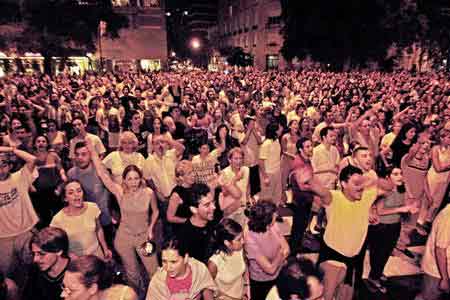 By
11:30pm the rain is pouring down in buckets, but the crowd only
bangs the pots harder and jumps faster, chanting louder, ‘Que
llueve, que llueve, que el pueblo ne se mueve’ (let it rain,
let it rain, the people are staying here). And suddenly, unexpectedly,
almost on the stroke of midnight, the ‘represión’
begins. Motorcycle police appear and begin to fire teargas and rubber
bullets, causing panicked running here and there; as people on their
way home along the Avenida de Mayo approach the wide Avenida 9 de
Julio, a line of cops appears and fires teargas and rubber bullets
from the front and from side-streets. In the Plaza, people taking
shelter from the rain in front of the cathedral are fired upon with
gas and rubber bullets. The demonstration had been noisy but entirely
peaceful - on TV reports, there is just a single image of a youth
throwing a molotov cocktail at lines of police who have already
emptied the square. It is an incomprehensible response in already
volatile times. I hear a report on the radio of a woman of 70, on
the ground badly wounded, her legs full of rubber bullets, and a
young man with two in his head. Back home, we watch on TV as 20
people, under arrest, are forced to lie face down in the rain with
their hands above their heads - ‘It’s just like during
the dictatorship’, someone says. There are still 300 demonstrators
at Congress, completely surrounded by police. They are chanting
and jumping - ‘El que no salta es policía’ (whoever’s
not jumping is police). We see three young men with their arms over
their heads being thrust towards a police bus. Their t-shirts are
pulled over their heads from the back by police and at least one
is bleeding heavily from the head. A policeman in soaked t-shirt
and shorts is directing uniformed officers as they hustle the lads
onto the bus. In the bar someone says - ‘These sons-of-bitches
haven’t even been paid’ (thousands of people have gone
unpaid, some for months). ‘No importa’, says someone else
‘- lo hacen de onda’. (They don’t mind - they do
it for fun). By
11:30pm the rain is pouring down in buckets, but the crowd only
bangs the pots harder and jumps faster, chanting louder, ‘Que
llueve, que llueve, que el pueblo ne se mueve’ (let it rain,
let it rain, the people are staying here). And suddenly, unexpectedly,
almost on the stroke of midnight, the ‘represión’
begins. Motorcycle police appear and begin to fire teargas and rubber
bullets, causing panicked running here and there; as people on their
way home along the Avenida de Mayo approach the wide Avenida 9 de
Julio, a line of cops appears and fires teargas and rubber bullets
from the front and from side-streets. In the Plaza, people taking
shelter from the rain in front of the cathedral are fired upon with
gas and rubber bullets. The demonstration had been noisy but entirely
peaceful - on TV reports, there is just a single image of a youth
throwing a molotov cocktail at lines of police who have already
emptied the square. It is an incomprehensible response in already
volatile times. I hear a report on the radio of a woman of 70, on
the ground badly wounded, her legs full of rubber bullets, and a
young man with two in his head. Back home, we watch on TV as 20
people, under arrest, are forced to lie face down in the rain with
their hands above their heads - ‘It’s just like during
the dictatorship’, someone says. There are still 300 demonstrators
at Congress, completely surrounded by police. They are chanting
and jumping - ‘El que no salta es policía’ (whoever’s
not jumping is police). We see three young men with their arms over
their heads being thrust towards a police bus. Their t-shirts are
pulled over their heads from the back by police and at least one
is bleeding heavily from the head. A policeman in soaked t-shirt
and shorts is directing uniformed officers as they hustle the lads
onto the bus. In the bar someone says - ‘These sons-of-bitches
haven’t even been paid’ (thousands of people have gone
unpaid, some for months). ‘No importa’, says someone else
‘- lo hacen de onda’. (They don’t mind - they do
it for fun).
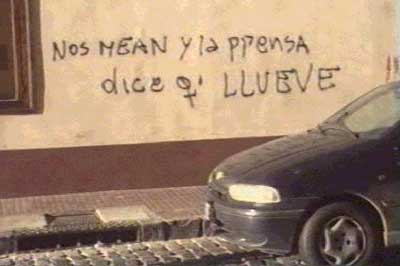 PS.
This morning, tho’ some of the press made the point that the
demo had been entirely peaceful and the police action unprovoked,
most of the TV news, as always, reverted to type and lied. As graffiti
here in the barrio where we are staying says, ‘Nos mean y la
prensa dice q’ llueve’ (they piss on us and the press
says it’s raining). PS.
This morning, tho’ some of the press made the point that the
demo had been entirely peaceful and the police action unprovoked,
most of the TV news, as always, reverted to type and lied. As graffiti
here in the barrio where we are staying says, ‘Nos mean y la
prensa dice q’ llueve’ (they piss on us and the press
says it’s raining).

|


 The
Presidential Palace - The Casa Rosada - on the central Plaza de
Mayo, 20th December
The
Presidential Palace - The Casa Rosada - on the central Plaza de
Mayo, 20th December *
Serious street fighting followed, that night and the next day, and
35 people were killed during the two-day insurrection; 5 were shot
dead by police in and near the Plaza de Mayo, and many others were
killed by police and shop-keepers during lootings.
*
Serious street fighting followed, that night and the next day, and
35 people were killed during the two-day insurrection; 5 were shot
dead by police in and near the Plaza de Mayo, and many others were
killed by police and shop-keepers during lootings. Mon,
21 Jan 2002
Mon,
21 Jan 2002 By
11:30pm the rain is pouring down in buckets, but the crowd only
bangs the pots harder and jumps faster, chanting louder, ‘Que
llueve, que llueve, que el pueblo ne se mueve’ (let it rain,
let it rain, the people are staying here). And suddenly, unexpectedly,
almost on the stroke of midnight, the ‘represión’
begins. Motorcycle police appear and begin to fire teargas and rubber
bullets, causing panicked running here and there; as people on their
way home along the Avenida de Mayo approach the wide Avenida 9 de
Julio, a line of cops appears and fires teargas and rubber bullets
from the front and from side-streets. In the Plaza, people taking
shelter from the rain in front of the cathedral are fired upon with
gas and rubber bullets. The demonstration had been noisy but entirely
peaceful - on TV reports, there is just a single image of a youth
throwing a molotov cocktail at lines of police who have already
emptied the square. It is an incomprehensible response in already
volatile times. I hear a report on the radio of a woman of 70, on
the ground badly wounded, her legs full of rubber bullets, and a
young man with two in his head. Back home, we watch on TV as 20
people, under arrest, are forced to lie face down in the rain with
their hands above their heads - ‘It’s just like during
the dictatorship’, someone says. There are still 300 demonstrators
at Congress, completely surrounded by police. They are chanting
and jumping - ‘El que no salta es policía’ (whoever’s
not jumping is police). We see three young men with their arms over
their heads being thrust towards a police bus. Their t-shirts are
pulled over their heads from the back by police and at least one
is bleeding heavily from the head. A policeman in soaked t-shirt
and shorts is directing uniformed officers as they hustle the lads
onto the bus. In the bar someone says - ‘These sons-of-bitches
haven’t even been paid’ (thousands of people have gone
unpaid, some for months). ‘No importa’, says someone else
‘- lo hacen de onda’. (They don’t mind - they do
it for fun).
By
11:30pm the rain is pouring down in buckets, but the crowd only
bangs the pots harder and jumps faster, chanting louder, ‘Que
llueve, que llueve, que el pueblo ne se mueve’ (let it rain,
let it rain, the people are staying here). And suddenly, unexpectedly,
almost on the stroke of midnight, the ‘represión’
begins. Motorcycle police appear and begin to fire teargas and rubber
bullets, causing panicked running here and there; as people on their
way home along the Avenida de Mayo approach the wide Avenida 9 de
Julio, a line of cops appears and fires teargas and rubber bullets
from the front and from side-streets. In the Plaza, people taking
shelter from the rain in front of the cathedral are fired upon with
gas and rubber bullets. The demonstration had been noisy but entirely
peaceful - on TV reports, there is just a single image of a youth
throwing a molotov cocktail at lines of police who have already
emptied the square. It is an incomprehensible response in already
volatile times. I hear a report on the radio of a woman of 70, on
the ground badly wounded, her legs full of rubber bullets, and a
young man with two in his head. Back home, we watch on TV as 20
people, under arrest, are forced to lie face down in the rain with
their hands above their heads - ‘It’s just like during
the dictatorship’, someone says. There are still 300 demonstrators
at Congress, completely surrounded by police. They are chanting
and jumping - ‘El que no salta es policía’ (whoever’s
not jumping is police). We see three young men with their arms over
their heads being thrust towards a police bus. Their t-shirts are
pulled over their heads from the back by police and at least one
is bleeding heavily from the head. A policeman in soaked t-shirt
and shorts is directing uniformed officers as they hustle the lads
onto the bus. In the bar someone says - ‘These sons-of-bitches
haven’t even been paid’ (thousands of people have gone
unpaid, some for months). ‘No importa’, says someone else
‘- lo hacen de onda’. (They don’t mind - they do
it for fun).  PS.
This morning, tho’ some of the press made the point that the
demo had been entirely peaceful and the police action unprovoked,
most of the TV news, as always, reverted to type and lied. As graffiti
here in the barrio where we are staying says, ‘Nos mean y la
prensa dice q’ llueve’ (they piss on us and the press
says it’s raining).
PS.
This morning, tho’ some of the press made the point that the
demo had been entirely peaceful and the police action unprovoked,
most of the TV news, as always, reverted to type and lied. As graffiti
here in the barrio where we are staying says, ‘Nos mean y la
prensa dice q’ llueve’ (they piss on us and the press
says it’s raining).